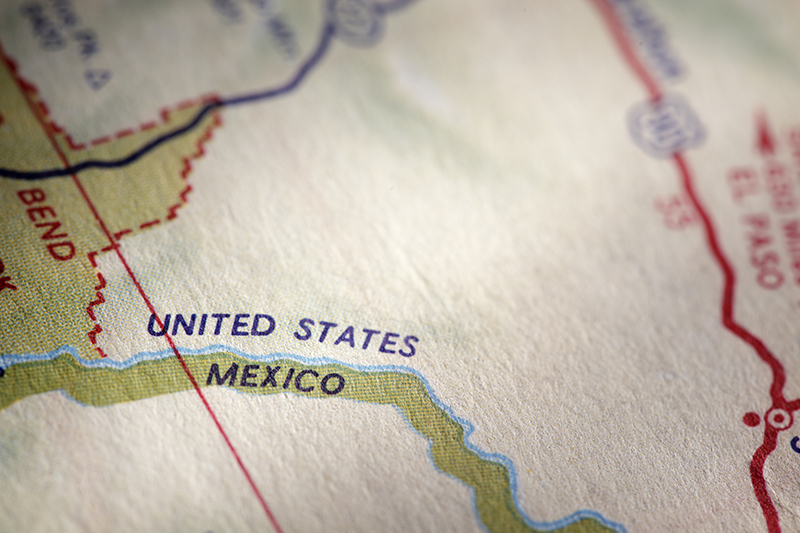Topic Page: Covid-19 and Immigration

AUSTIN, Texas. – National old-media outlets like the New York Times, the Washington Post, and the Wall Street Journal reported in May and early June that large influxes of severely ill patients who caught Covid-19 in Mexico have flooded north over the border and literally clogged California and Arizona hospitals.
But as Covid cases have spiked in those states, and in Texas, where border hospitals have been overwhelmed, and the blame was placed on opening bars and lifting limits on Memorial Day gatherings, those media outlets never again referred to their own earlier reporting about the border influx.
You'll have to ask their editors why, more consequentially, they also never followed up with hard data about what percentage of the spikes might be due to the Mexico influx they reported, of mostly Mexican visa holders, American expatriate retirees, and at least some illegal migrants, according to my own small contribution. In a blog post last week, I pointed out that such knowledge, amid mounting evidence that the Covid influx from Mexico continues, is necessary to help policy-makers know how to prescribe exact remedies that would most effectively preserve hospital space and ultimately save lives.
Finally, three members of Congress have moved to pick up where the media failed in filling this important gap in our knowledge, with a letter to Chad Wolf, Acting Secretary of the Department of Homeland Security, requesting answers to 13 questions by this Friday, July 17, and an in-person briefing no later than Friday, July 24.
In their letter, Reps. Chip Roy (R-Texas), Paul A. Gosar (R-Ariz.), and Ted Budd (R-N.C.) aptly noted how important it is to public policy-making to know more about the contours of this reported Mexico influx:
It is imperative that DHS and CBP [U.S. Customs and Border Protection] have the necessary tools, resources, and protocols in place to manage a potential outbreak or wave of migrants at the border in order to mitigate the spread of Covid-19 and prevent a contribution to increases in hospitalizations in southern states. It is also vital that your department work with the administration, state and local governments, and public health authorities to collect and disseminate data pertinent to understanding the level in which traffic across our border, both legal and illegal, is contributing to the spread of coronavirus in the United States.
Among other information requests the national media should have made, but didn't, the congressmen want to know how many illegal aliens apprehended within 25 miles of the border has CBP transported to hospitals since February. Amid reports that hundreds of Border Patrol agents have been taken off-line into quarantine because of contact with infected border-crossers, the lawmakers also asked for an accounting of the apparent devastation among agents and their ability to manage the flow of narcotics and migrants, "and to end cartel dominance of our borders".
The letter asks for other obviously important information as well. Are CBP agents stopping vehicles at inland check points coming from the direction of the Mexican border, as they routinely are between U.S. states, or "are people being ushered through check points out of fear of transmission of the virus"?
The Center for Immigration Studies is doing its part, as well, beyond merely pointing out mounting evidence that some percentage of Covid patients were infected in Mexico and came over, and opining about the dearth of information that would finally establish how many. CIS has filed a FOIA request with CBP and, separately, requests under the Texas Public Information Act with State of Texas health authorities seeking data that would reflect the home towns and home countries of Covid patients recently hospitalized along the border.
Public agencies have this information at their fingertips right now and could provide it without violating federal protections of individual medical histories. But public agencies and local officials in Texas seem almost mendacious in their resistance to providing any hint of what's coming in from Mexico, where sister city hospitals are completely overrun just as they were across the border from California and Arizona.
One of the hardest-hit border counties in Texas, for instance, Hidalgo County, puts out regular reports via Twitter listing the sex, age, and — crucially — the towns of current residence, of every newly hospitalized patient. But a close look at the reports shows that home towns often are listed as "undisclosed" or "unknown", as this July 2 tweet from Hidalgo county shows:
7 residents have died due to complications related to COVID-19 & 268 tested positive for the virus. Total positive cases is 4,520.
— Hidalgo County (@HidalgoCounty) July 3, 2020
Due to a new reporting protocol, the hospitalizations numbers have dramatically increased. 451 people are hospitalized, 104 of those cases in ICU. pic.twitter.com/UTvzc15MqV
A county spokesman told me this is done to protect identities in tiny towns. But it also would be easy to categorize as "undisclosed" all hometowns that happen to be on Mexican soil.
This shroud of darkness needs to be penetrated. The congressmen deserve plaudits for this service in the public interest.
The full truth about what is happening along the U.S.-Mexico border during this secondary spike needs to come out. The sooner, the better, for the good of the country.
